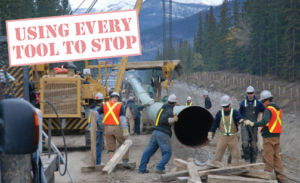By Chris Gardner, President, Independent Contractors and Businesses Association
(This op/ed first appeared in The Province on August 4, 2017, and is now free for anyone to publish.)
Bureaucrats aren’t known for their horror writing skills. But Delta’s report on what would happen to the Massey Tunnel if there was an earthquake should send chills down the spine of every driver in the Lower Mainland.
 Imagine an ordinary weekday morning, with traffic on Highway 99 backed up, as usual, in both directions. Hundreds of vehicles are slowly trickling through the tunnel when the ground begins to shake – a 6.7 earthquake.
Imagine an ordinary weekday morning, with traffic on Highway 99 backed up, as usual, in both directions. Hundreds of vehicles are slowly trickling through the tunnel when the ground begins to shake – a 6.7 earthquake.
The tunnel, described in the report as, “a brittle structure in highly unstable/liquefiable soils,” buckles. The ground under it turns to mush. Power is lost almost immediately, plunging the structure into darkness.
Cars and trucks slam on their brakes, causing major accidents in every lane. The tunnel rocks upward, breaks free and starts moving downstream, pushed by the Fraser River.
Muddy river water gushes into the dark tunnel, trapping motorists. At this moment, an emergency pump is supposed to whir into action and “should” keep the water level low enough for people to escape during the following hour. “Should” isn’t a great bet.
One can only imagine the terror in what would likely be the final moments for many of these people. It’s a risk that motorists using the Massey Tunnel take every day.
If this was not scary enough, where is the other place you wouldn’t want to be in a car when the “big one” hits? The 80-year-old Pattullo Bridge, already on the verge of falling into the Fraser.
How did one of the largest cities in a G7 economy, a city considered one of the most desirable places to live in the world, end up with two major pieces of failing infrastructure? Two reasons: old-fashioned government neglect, and a relatively new, but increasingly fashionable, movement finding favor among activists: Build Absolutely Nothing Anywhere Near Anyone.
To their credit, the previous BC Liberal government tried to address Massey. The tunnel is not safe, it’s not effective at moving people and it’s become one of the biggest traffic chokepoints in the country. Yet the Metro Vancouver mayors are fighting its replacement tooth and nail.
All the mayors have voted against Massey – except for Delta’s Lois Jackson, who has spent the most time studying and considering it. Jackson knows that, after 145 technical and scientific reports examining all of the options, a new bridge is the safest and most cost-effective. The environmental assessments are complete, more than 3,000 people attended 110 public meetings, and construction is about to start. So, what’s the problem?
The provincial government has changed hands, and the NDP-Green alliance is looking to kill the project under the guise of “working with” the Metro Vancouver mayors.
Yes, they want to work with those same Metro Vancouver mayors who can’t even manage their own TransLink infrastructure properly. The mayors have responsibility for two major bridges: the new Golden Ears and the old Pattullo. It’s failing at half its portfolio, yet the NDP give their opinion precedence.
In the mayors’ world, failure at TransLink is always someone else’s fault: ‘out-of-touch’ Ottawa, ‘anti-urban’ Victoria, chintzy taxpayers for not excitedly handing over more money to wasteful TransLink, or ‘selfish’ drivers who should just get out of their cars and take transit.
We need to build more infrastructure – not less. Metro Vancouver is growing. We need to invest in transit, in new roads and new bridges to ensure that we can move people and goods in, around, and through the region. It’s not about choosing one project over another, it’s about revitalizing our aging infrastructure and building a strategic mix of new assets so that businesses located in the region can compete and families living in the region can get around safely and efficiently.
As the NDP prepares to cancel the Massey Tunnel replacement, keep in mind two facts: the Geological Survey of Canada records more than 2,500 earthquakes in western Canada and off the B.C. coast every year. Metro Vancouver has at least a 30% chance of a major earthquake in the next 50 years.
Let’s pray our elected officials are not really prepared to roll the dice with people’s lives.






